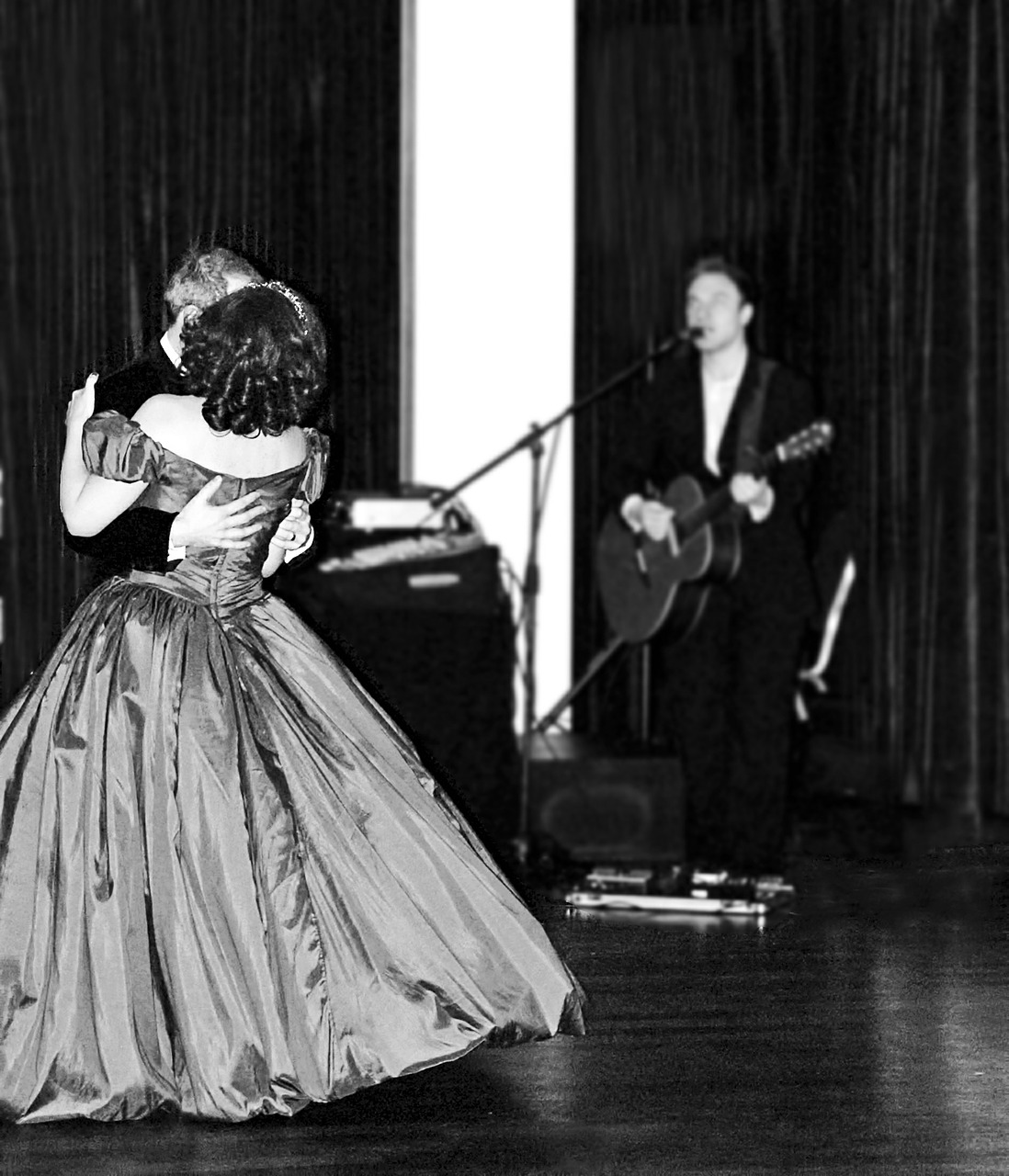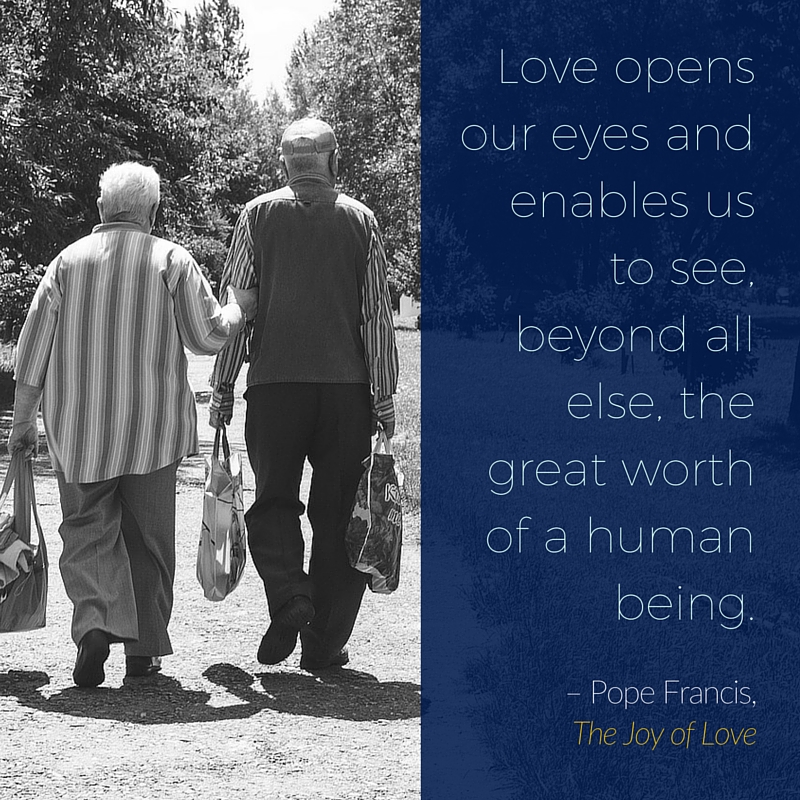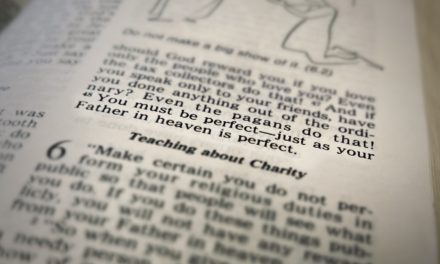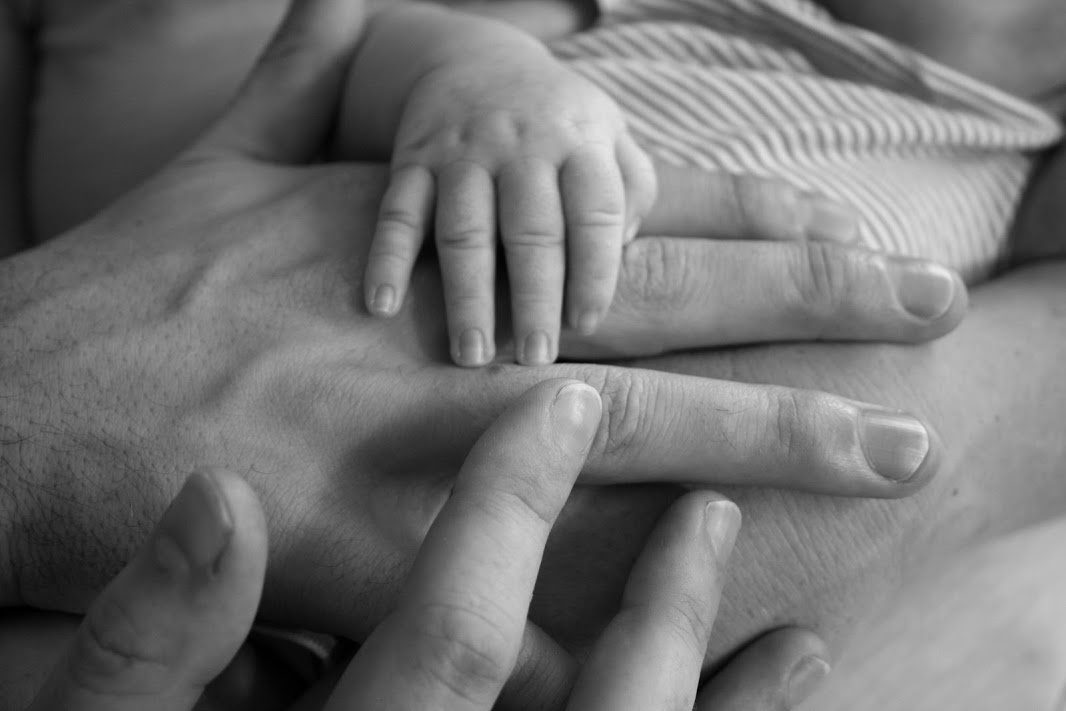
Elizabeth and Henry McCord, Madam Secretary (CBS)
Marriage seems to be losing popularity. According to the Pew Research Center, only 51% of adults in the United States are married, versus 72% in 1960. Still, a majority of women and men do want to be married (61%). As a couple who’s been married nearly two years, and as people who love telling others how awesome marriage is, my wife and I have wondered why the many in media or comedy are so negative about marriage. Even though the divorce rate has decreased, it seems so engrained in our psyches that marriage is seen as a burden rather than a grace that is freely embraced. Images of good marriages are hard to find on TV, yet each time Sarah and I do find marriage being shown in a positive light we fall in love with the show (Madam Secretary and Parenthood are two examples).
This past week Pope Francis released his apostolic exhortation Amoris Laetitia (The Joy of Love). Many were expecting much to be said about divorced and remarried Catholics being able to receive communion or about same-sex marriages. Yet the document focused little on those issues. While important issues, the pope chose to focus on the heartbreaking state of broken heterosexual marriages, something we don’t often address in our current marriage debates. Amoris Laetitia is a beautiful and poetic writing on the gift of love and marriage. It’s comprehensive. It addresses families and marriages at practically every stage and situation. It’s a long overdue exhortation on marriage rooted in the real situations families have to deal with and as I read through its 264 pages, I could relate it well to my own marriage. As Thomas D. Williams says in his Crux article, “I suddenly found a letter that was written to me and for me, and I cannot help but think that many others will have a similar experience.”
 The Challenges of Marriage
The Challenges of Marriage
The pope has a clear view of the reality of marriages that are superficial or based on a lack of freedom. Marriage, he says, “can come to be seen as a way station, helpful when convenient, or a setting in which rights can be asserted while relationships are left to the changing winds of personal desire and circumstances.” Yet at the same time he acknowledges the challenges of marriage, especially in their early years. Sarah and I found our first months especially challenging. The fantasy weddings from the movies and even the Church’s “almost artificial theological ideal of marriage”, Pope Francis says, can become an “excessive idealization … [that] has not helped to make marriage more desirable and attractive, but quite the opposite.” So the pope instead founds his discussion in practical realities. He calls marriage a process and a path to personal development, together. The couple journeys with and through their imperfections. “We have to realize that all of us are a complex mixture of light and shadows.”
 Discernment
Discernment
Yet marriage is still referred to as a burden. I even joke with Sarah, lovingly calling her my ball and chain. But some do fear marriage as a burden and a loss of independence. They see the failures of other couples and want to avoid it, so they unrealistically postpone marriage or reject it all together. We’re always amazed that some who propose marriage to their partners actually don’t know if their partner will say yes. Shouldn’t such a life-commitment be discussed? The pope says, “The decision to marry and to have a family ought to be the fruit of a process of vocational discernment.” Sarah is not a ball and chain that weighs me down but more like the chain of an anchor, keeping me steady.
Marriage as a Project
The pope sees a great need for more transparency in relationships, dialogue, and an outward focus of concern for justice, all things Sarah and I wish to be intentional about in our married life. He uses language I’ve used before when referring to Ignatius’ Call of the King meditation, referring to marriage as “a common project” that enriches the world. The stereotype of marriages becoming about nagging, lack of intimacy, and growing apart comes from a lack of commitment to this common project. It comes from a lack of quiet listening to the other, forgiving, and continually working to develop closeness. He even suggests shared daily rituals like a kiss, a blessing, or sharing chores. He says young people need to share their dreams and plans, gaze into each other’s eyes, and appreciate one another. His beautiful yet sobering advice to care deeply about an other is something we all should follow. “Love,” he says, “opens our eyes and enables us to see, beyond all else, the great worth of a human being.” In the exhortation the pope even takes 1 Corinthians 13, one of the most popular wedding readings (“Love is patient. Love is kind.”), and meditates on it line by line – it’s something couples can make their own prayer.
 Tenderness and Transparency
Tenderness and Transparency
One virtue Pope Francis emphasises is tenderness, which he says lets us approach the other with “immense respect”. It’s a virtue that treasures and protects the other’s freedom and is a sign of a free embrace of love, not a dominating or possessive one. The stand-up comedy that focuses on nagging wives and irresponsible husbands is not only rooted in a lack of sincerity and dialogue, but a lack of transparency and trust. “Those who know that their spouse is always suspicious, judgmental and lacking unconditional love, will tend to keep secrets, conceal their failings and weaknesses, and pretend to be someone other than who they are.” Whenever I find myself boasting about the awesomeness of marriage to my high school students I emphasise that my wife and I don’t have secrets. There’s truly a sacred trust which only deepens our love and appreciation for each other.
It may be hard for some to accept relationship advice from a celibate man, but I have no doubt the pope, as all human beings do, experienced love. As for marriage, quite often an objective perspective can be extraordinarily helpful. Williams at Crux says, “one gets the sense of a deep pastoral wisdom of a person who has spent long hours listening to married couples, hearing confessions, listening to problems, praying for solutions.” The pope is trying to recapture the gift of marriage, the treasure of sincere relationship; his focus is not on dry theology, but a fresh take on the situations real families are experiencing. The Joy of Love, while a lengthy document, must be read and prayed with by families and couples. Sadly, many will not do that. Many will continue placing marriage in the genre of comedy or in the class of the obsolete. But those who do take the time to see the way Francis sensitively unwraps the gem of marriage and its awesomeness, will find the idea of family so appealing, so important for personal growth and betterment, that they will no longer relegate it as obsolete but raise it to something so beneficial to human life and dignity that they, like my wife and I, will not be able to stop talking about it.
Related post:
Listen to an audio version of this post (including clips from comedy and their negative view of marriage)…









I agree one hundred percent! There is such a lack of commitment in society these days. Thank you for posting this!
Sometimes I am uncertain about why people get married. I believe some couples lack an understanding of exactly what will happen after the hubbub of the engagement and planning and parties. There is no “how to care for” tag attached. BUT, when I think of the people who have made a commitment I see that people can still grasp the beauty of that. There are three things in a marriage, husband, wife and a loving commitment. One carries the other two through life.
Thanks for that Andy. I, too, am saddened by the lack of commitment to/in marriage nowadays. No-one said it would be easy- it is not! There are ups and downs in every marriage just as there are in life. It takes time, patience, understanding, compassion, openness, love – a realisation that it is not all about ME anymore. Now there is another person to care for, whose wants and needs must be considered. 1 Corinthians 13:13 is the essential element of any marriage:”But the greatest of these is love.” Hold on to that. This year my wife and I celebrate 55 years of marriage for which I thank God each and every day.
When people ask me about my marriage, or are trying to decide whether to get married, they nearly always use the same word: happy. Are you happy? Do you think he’ll make me happy? To which I respond: well, that seems irrelevant. My husband and I have always been very clear: we didn’t marry for happiness; we married for mutual formation.
Although I also recognize that not everyone is called to be formed in that way. I have deep respect for my friends who have found other institutions, communities, and relationships that impact and form them just as deeply, and whose singleness forms them as well. (And even if I didn’t have that respect naturally, St Paul implores me to.)
I’m grateful for all your comments. The pope has deep insights into the desire for and the fruits of marriage—and so do you. Blessings to you all.